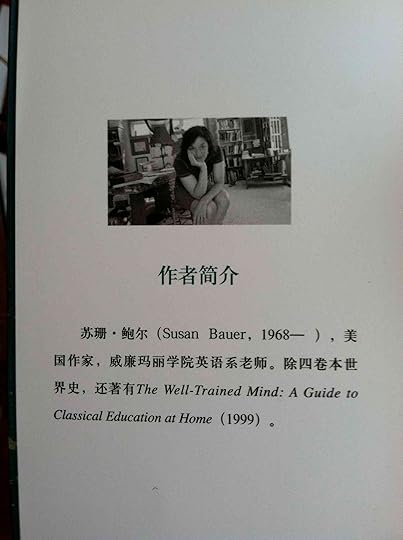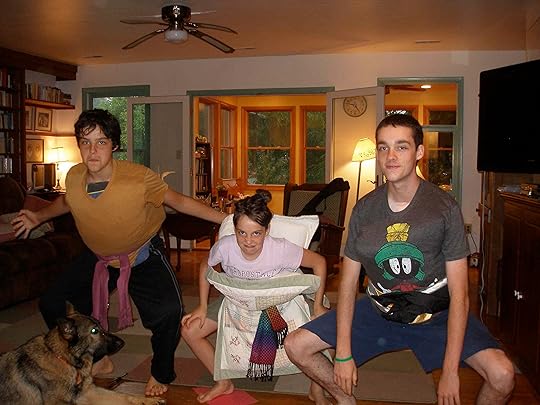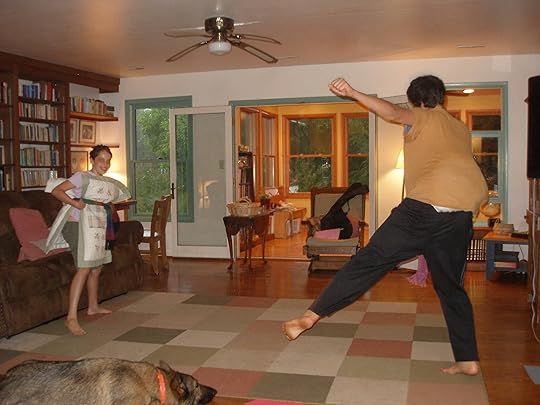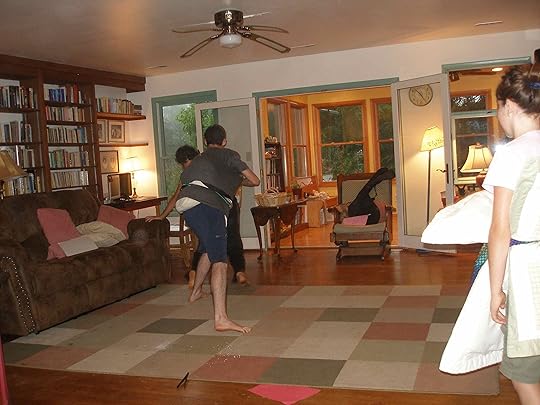Susan Wise Bauer's Blog, page 14
August 3, 2011
Obfuscation and turgidity, Part III: Just plain fear
She had not told her parents that she had written the book….She didn't even send [them] one. If that had noticed its existence, they didn't mention it.
Most beginning writers intend to impress, placate, or shock imaginary parents. Real ones are a different matter.
I ran across that quote, from A. S. Byatt's A Whistling Woman, maybe seven or eight years ago, and it stuck in my mind. (If you've followed my blog for a while, you probably know that I'm a huge Byatt fan and actually got to be on a BBC radio program with her once.)
It came back to my mind when I was finishing Ralph Keyes' The Courage to Write: How Writers Transcend Fear. This is my third and final post about the book, and that particular kind of fear–described both by Byatt and by Keyes–is the kind that struck closest to home for me.
A quick recap of my previous two posts about the book: Keyes points out that writers produce bad, unclear, over-wordy work for at least two reasons: they want to sound intelligent and are afraid that plain and straightforward prose won't accomplish this; and they are afraid their thoughts will be rejected or jeered at, so they obscure their ideas in impenetrable prose.
I've certainly seen both these fears in operation, but they're not my particular Waterloo.
This one is.
Anxiety about reactions by others can cripple a writer. When expressed at all, this fear is usually articulated as, "What will people think of me when they read what I've written?" But it's not "people" we're most scared of. It's specific individuals….
I often ask writing students to picture privately the person whose response to their writing concerns them the most. Usually it's a spouse or parent. Sometimes it's another relative, a friend, or an old teacher….Whoever's opinion worries us the most is our "censor in chief."
Keyes points out that this fear is not unfounded, because good writing deals with human relationships, and what we know about human relationships comes from…our own. With people who are close to us. And will read what we write.
To write well, he tells us, we
must write honestly; not in the literal but in the emotional sense….To touch their readers' feelings, writers must first improve reception of their own, then set up loud-speakers so that others can listen in. Doing this creates potential problems….Emotionally candid writing can jeopardize important relationships. Any ongoing relationship is based on some discretion. Writing demands revelation. Reconciling this conflict puts writers in a literary-human bind: wanting to be open yet not wanting to offend those they care about. This is a fundamental courage point.
I will say right now that I have no idea how to resolve this conflict. Keyes provides a few quotes from other writers who have faced it: William Styron ("I was half paralyzed by the awareness that my parents and my sisters…would read whatever version of their life came out of my typewriter"); John Fowles, who rewrote one of his novels only after his parents died because he didn't want them to read it the way he wanted to write it; Allen Ginsberg, who never intended to publish "Howl" ("I wouldn't want my daddy to see what was in there"); Gordon Lish ("I don't see how you can write fiction honestly and ably without interfering with serious relationships").
Well, that's a lot of help. Particularly since I actually don't want my private life to resemble the personal relationships of any of the writers Keyes quotes.
So Keyes didn't give me any answers. But the two chapters where he talks about this kind of fear were revelatory for me, because I've spent years complaining to my closest confidants that I never can find the time to do the kind of writing closest to my heart. I love the history I write, and I get a particular kind of satisfaction from writing curricula. I don't want to quit doing these things. But there are other books I want to write–and have wanted to write–and can't seem to get to.
Now I know why. I pictured the particular reactions of particular readers, as Keyes suggests, and it became clear: I'm not writing those books because I'm afraid of what those readers will say.
Let me quickly absolve my parents–of complete responsibility, anyway. All writers worry about what their parents will say, and the closer the relationship is, the more we worry. That's a universal. ("Parents," Keyes writes, "are the most ubiquitous censors in chief for writers at every level.")
But I've discovered that I have a much wider circle of potential censors.
This is an eye-opener.
I've got no solutions. And while fears are always worse than realities, I think my fears are pretty solidly based in fact. (Hey, I've gotten jumped on for being ASSOCIATED with a book that some of my regular readers didn't like, and I didn't even write it.)
On the other hand, I have suddenly been able to work on those long-neglected manuscripts. I'm behind my deadline on the history series and barely keeping up with the language curricula, so I haven't abandoned them; don't worry. But all at once I've found some time that didn't exist before, and I've used it to write words that I couldn't get out, two months ago.
Sometimes looking at a problem with two eyes is the closest you get to a solution.
July 30, 2011
Twitter Weekly Updates for 2011-07-31
Airline pilots who look like they're seventeen do not fill me with confidence. #
Writing history w/synonyms. Contention, conflict, strife, struggle, quarrel, dispute, fight, battle, combat, scuffle, brawl, melee, fray… #
Time to explain the Investiture Controversy. Again. #
Yes, I actually wrote, "He pacified the princes by making peace with the pope." This is why you should always read your stuff out loud. #
I have an iPhone! #
Powered by Twitter Tools
July 29, 2011
The Peking University Press edition of the History of the Ancient World
This afternoon, I received my author's copies of the Chinese edition of The History of the Ancient World, published by Peking University Press.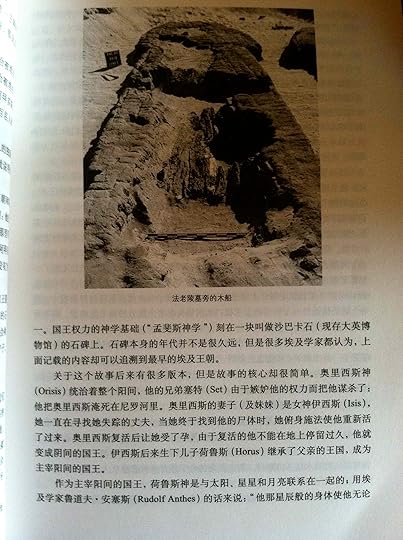
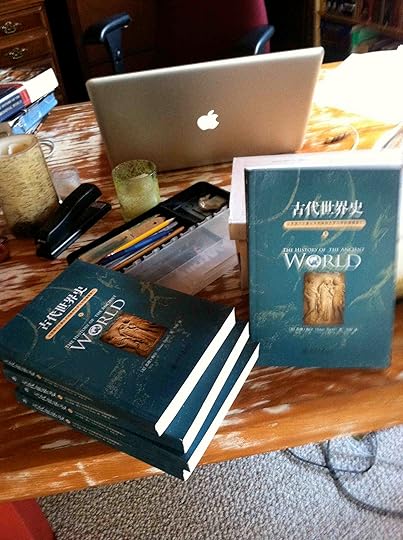
The editors at Peking University Press seem to have chosen their own illustrations…and there are, sadly, no maps or timelines. Which does help trim the length. I think it must have been significantly abridged as well, and I'm curious about what was cut.
I think it's funny that they used that photo, which was pulled from a recent magazine article. But at least everyone in China now knows exactly how old I am.
So far, the History of the Ancient Worldhas appeared in Chinese, Russian (AST Publishing Group, Korean (Theory and Praxis), Bulgarian (Prozorets), Indonesian (PT Elex Media Komputindo), and Spanish (Paidos). I'm told by people who read Spanish better than I do that the Paidos translation is a particularly good one.
Foreign publishers don't always send author's copies, and so far I've only seen the Chinese, Korean, and Spanish volumes.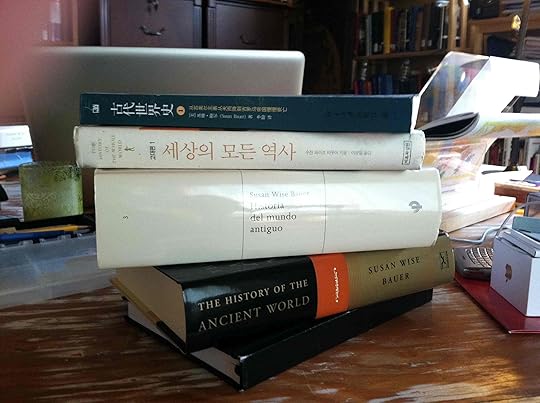
The History of the Medieval World is also in the pipeline, but translation is a long process…kind of like the books themselves.
Off now to cut some more pages from the still-too-long History of the Renaissance World manuscript…
July 23, 2011
Twitter Weekly Updates for 2011-07-24
Me to DD10, this morning: "So how are you doing today?" DD10: "I'm great! I just had two English muffins and deja vu." #
Bought DD10 "Dragonology: The Game" because it was her dearest wish. I believe I have visibly aged since we started playing it. An eon ago. #
Sitting at RIC waiting on a plane to Houston, and from thence to California for CHN: http://t.co/5NMJrCb Nice and cool in here. #
Home education in SoCal: different world than home ed in VA. Tipoff: Ayn Rand booth in vendor hall. Also the home school dad in the kilt. #
Powered by Twitter Tools
Home education on a hot afternoon
I have a confession to make: I hate doing crafts and activities.
I've used my own Story of the World curriculum with my kids, and now we're going through it with my ten-year-old daughter. There are lots and lots (and lots) of supplementary crafts and activities in there. The boys were fine with skipping them.
Apparently girls are different. She ADORES crafts and activities. She LOVES them. Whenever I say, "Em, what do you want to today today," she says with huge shining eyes, "Let's do a PROJECT."
And then my heart sinks, because what I really want to do is…read another book. However, in an effort to be a good home-educating mom, I've promised her that we can do one history activity a week.
This week, she's just finished reading "Warlords of Japan," from the third volume of The Story of the World The project she picked was "Sumo Wrestling."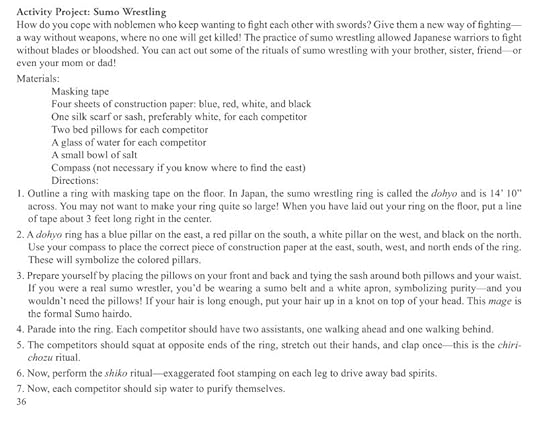

I kind of expected her to pick "Wind Poem" or "Tea Ceremony," but no. After all, she has brothers. Who immediately got involved (since it was too hot for them to be doing anything other than hunkering down in the air conditioning).
And then Em and Dan faced off.
(The shepherd is refereeing.)
I think this one was kind of a foregone conclusion.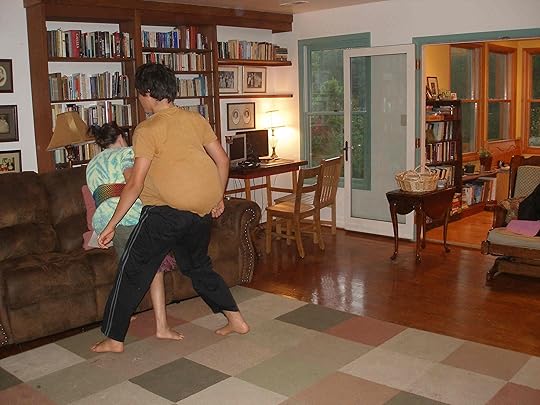
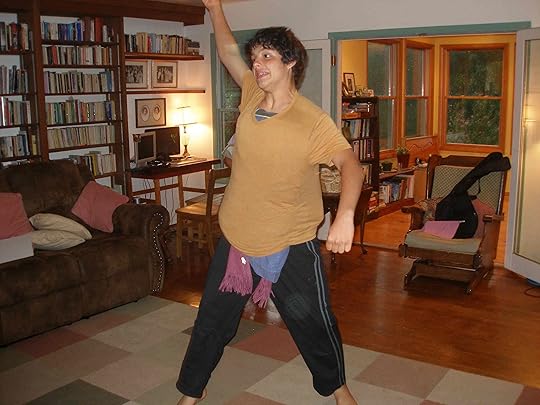
Then Ben and Dan gave it a whirl. This seems to have alarmed the shepherd.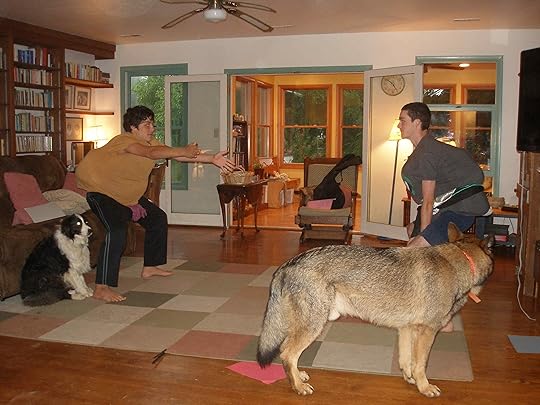
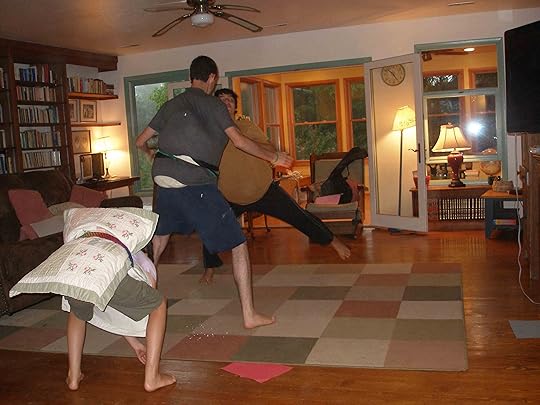
Ben did suggest that he and Em play a championship match, but I decided it was cookie time instead.
See, you all KNEW that highly intellectual learning was taking place in the Bauer household. Now I've confirmed it.
July 16, 2011
Twitter Weekly Updates for 2011-07-17
The twelfth-century history of central Africa is tough enough. Why does it have to be in French?? #
While I've been faithfully using my Anti-Puffing Under-Eye Serum, I'm starting to suspect that I may in the placebo group. #
While I've been faithfully using my Anti-Puffing Under-Eye Serum, I'm starting to suspect that I may be in the placebo group. #
New resource recommendation up at the Well-Trained Mind blog: http://t.co/AzBAtam #
Just finished the Midsummer Vacuuming of my chicken-shed office. 14 dead wasps, 10 dead moths, innumerable spiders, and a dead lizard. #
Powered by Twitter Tools
July 13, 2011
Obfuscation and turgidity, Part II: You might not like what I'm about to say (and I might not actually know what it is)…
Last week I finished reading The Courage to Write: How Writers Transcend Fear, by Ralph Keyes. As you can guess from the title, Keyes talks a lot about fear.
Fear, he suggests, leads to turgid, jargon-fllled, just-plain-bad prose. In my previous post about the book, I pointed out that the reader's fear shares some of the responsibility for bad writing; often, we don't blow the whistle on obscure prose because we think everyone else but us understands it. Keyes takes this a little further; he suggests that bad prose is a shield, of sorts, for the writer.
Writing at all takes courage. Submitting work for publication takes something closer to bravado….There is an alternative. That alternative is writing for publication, but on such obscure terms that readers will feel too ignorant to criticize.
Then he picks on academics. A lot.
In a speech to the Association of American University Presses, Patricia Nelson Limerick, a history professor at the University of Colorado, tried to make sense of her colleagues' preference for intellectual jive talk. Limerick thought it was a product of their timidity. "Professors are often shy, timid, and even fearful people," she told her audience, "and under those circumstances, dull, difficult prose can function as a kind of protective camouflage." From graduate school on, Limerick explained, career academics learn….[to] protect themselves by defending cautious ideas with insider words, complicated syntax, and qualifying phrases such as "as case might be made" and "one could argue that."
….The rough-draft quality of impenetrable writing can soothe authors' nerves. If you haven't given writing your best shot, and the results are criticized, you're free to say, 'Shoot, I could have done better if I'd taken the time. That's just something I dashed off." If you do write your best, and your best gets panned, there is no place to run and hide…
…[T]o write well, we must express ourselves clearly and risk rejection. We can finesse this risk by generating fog.
Turgidity and obfuscation, in other words, results primarily from fear.
I'm not sure about this. I tend to think that you write badly when you don't know exactly what you're saying, and don't have the energy, or knowledge, or time to figure that out.
I see this kind of prose a lot. It strikes me as incomplete, not fearful.
Here's an example: I spent most of this morning wrestling with about thirty-five years of post-medieval Ethiopian history which, if I'm lucky, will take up a sentence (or half a sentence) in The History of the Renaissance World (aka The Book That Is Already Three Times As Long As The Final Draft Will Be). Here's a sample paragraph from a detailed history of Ethiopia after the fall of the Zagwe dynasty…
Of course, the two facets of domination discussed above may lead one, as the Oromo and Somali nationalists often argue, to invoke the colonial book. There is no doubt that the empire-building during the Menelik era was 'violent and semi-colonial in nature.' The power relations and the cultural stereotypes that characterize the relationship between the southern people and the northerners had some elements of colonial relations. A close look at the relationship between the conqueror and the conquered would, however, reveal that the subordination of the southern people to the Shewa Amhara cannot be posited as a colonial relation. Any analogy of the conquest of the south with European colonization belies the element of racism, which is an essential ingredient of European colonization that underlies the relationship between the colonizer and the colonized. The policy of racism erects a barrier that rigidly separates the colonizer from the colonized. The relationship of the northerners with the people of the south lack this critical element. The divide between the dominant Amhara and the subordinate south is not rigid and it can be crossed by, for example, baptism into Christianity, speaking Amharic, or through marriage.
That's the kind of prose I run across all the time. That doesn't strike me as fear. It's confusion and lack of time.
Try putting this passage into English. It would start (I think) something like this:
During the Menelik era, the empire-builders of the north treated the conquered south like…
And that's as far as I get. "A colony" would be the next phrase. But what does the writer mean by this? There's some specific behavior the writer has in mind. (What was it? Extermination? Land-stealing? Being snotty to the natives when you meet them in the street?)
Rather than telling us what that behavior is, the writer relies on a catch-phrase: colonization. I don't think this is fear. I think it's…well, I hesitate to use the word laziness (a very judgmental word, that).
OK, laziness. This passage would be clear and straightforward if the writer told us one or two specific "colonial" behaviors. To do that, the writer has to go find examples of this behavior. Real, specific, point-in-time occurrences. That takes time and effort. HUGE amounts of it.
And many pages of writing that won't make it into the final draft.
Maybe my editor at Norton will see this blog post and send me some chocolate.
So I'm not sure I buy this particular explanation for obfuscation and turgidity. I don't think that's a result of fear. It's an unwillingness, or an inability, to put in the time and work needed to be clear. If you doubt me, you try putting the last half of that paragraph into clear English. And you can't use the code-word racism. You have to be specific.
Have fun.
What happens when you're truly afraid? Ah…for that, you'll have to stay tuned for the third and final blog entry about The Courage to Write.
July 9, 2011
Twitter Weekly Updates for 2011-07-10
Returned from fireworks washout to find 6-ft blacksnake strangling a chicken–the sixth to die mysteriously w/out marks. Snake now dead too. #
Sometimes "Bleah" is just the word of the day. #
Just swam to Williamsburg and back. #
Apparently my 74-year-old mother was up at 7:30 AM, killing a snake with the meat cleaver. Good genes, there. #
Powered by Twitter Tools
July 6, 2011
Today's Historical Facts
On my Facebook page, I occasionally post a "Historical Fact of the Day"–generally the one interesting thing I've discovered in eight or ten hours of hard historical slog. It occurs to me that some of my Gentle Readers might not be on Facebook (if you can imagine such a thing), so every once in a while I'll post a digest here. Like this short collection of last week's Historical Facts…
 In 1697, Peter the Great left Russia to visit Europe. He travelled incognito, under the name Peter Mikhailov. Incognito, that is, with two hundred courtiers, trumpeters, surgeons, soldiers, and court dwarves. Oh, and he was six foot eight.
In 1697, Peter the Great left Russia to visit Europe. He travelled incognito, under the name Peter Mikhailov. Incognito, that is, with two hundred courtiers, trumpeters, surgeons, soldiers, and court dwarves. Oh, and he was six foot eight.
–Peter the Great: A Biography, Lindsey Hughes
 In 1115, King Koloman of Hungary, blinded both his brother Almos and his brother's 5-year-old son Bela. This, he thought, would guarantee the right of his own son Stephen to the throne. The year after, he died and Stephen became king; but he died childless in 1131. His cousin Bela then inherited and ruled perfectly well for ten years as Bela the Blind. (His wife did help him out quite a lot.)
In 1115, King Koloman of Hungary, blinded both his brother Almos and his brother's 5-year-old son Bela. This, he thought, would guarantee the right of his own son Stephen to the throne. The year after, he died and Stephen became king; but he died childless in 1131. His cousin Bela then inherited and ruled perfectly well for ten years as Bela the Blind. (His wife did help him out quite a lot.)
–Ritual and Politics, Zbigniew Dalewski
 Roger II, Norman Count of Sicily/southern Italy, got himself crowned actual king in 1130 by Pope Anacletus II (himself facing a papal rival and needing Norman military backup). "While Roger welcomed the formal approval of a pope…his own views are perhaps best expressed in a famous mosaic in Palermo…[which] shows Roger receiving the crown from Christ himself." Good to have that straight.
Roger II, Norman Count of Sicily/southern Italy, got himself crowned actual king in 1130 by Pope Anacletus II (himself facing a papal rival and needing Norman military backup). "While Roger welcomed the formal approval of a pope…his own views are perhaps best expressed in a famous mosaic in Palermo…[which] shows Roger receiving the crown from Christ himself." Good to have that straight.
–The Normans, Marjorie Chibnall
 In 1103, Bohemond of Antioch escaped the hostile Byzantine emperor by spreading rumors of his death and then leaving in a coffin: "In order that the corpse might be in a state of rare putrefaction, they cut the throat of a cock and put that in the coffin with him. By the fourth or fifth day, the horrible stench was obvious to anyone who could smell." Seasickness isn't in it.
In 1103, Bohemond of Antioch escaped the hostile Byzantine emperor by spreading rumors of his death and then leaving in a coffin: "In order that the corpse might be in a state of rare putrefaction, they cut the throat of a cock and put that in the coffin with him. By the fourth or fifth day, the horrible stench was obvious to anyone who could smell." Seasickness isn't in it.
–The Alexiad, Anna Comnena
July 2, 2011
Twitter Weekly Updates for 2011-07-03
Working on medieval Hungary this morning. Kind of waiting for something REALLY interesting to happen that doesn't involve border wars. #
Well, blindings and disembowelments are a LITTLE more interesting than border wars, I suppose… #
Really struggling with Serbia this morning. Not, I am given to understand, an uncommon experience. #
Flipping through CBD catalog that just came to office. First section: "Favorite Authors." Second section: "Favorite Women Authors." Hmm… #
DS14 just came in from chores to tell me that he has destroyed all wasp nests in the barn. Also that he has named the barn broom Wasp-Bane. #
EWW. This is not an urban legend, either: http://t.co/L1wkb3d #
Sometimes I sits and thinks. Sometimes I just sits. This afternoon appears to be one of the latter. #
Powered by Twitter Tools
Susan Wise Bauer's Blog
- Susan Wise Bauer's profile
- 1089 followers


